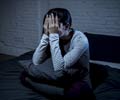Frequently Asked Questions
1. What is depression?Depression is more than the blues or the blahs; it is more than the normal, everyday ups and downs. Clinical depression is a serious health problem that affects the total person. In addition to feelings, it can change behavior, physical health and appearance, academic performance, social activity and the ability to handle everyday decisions and pressures.
2. What causes clinical depression?
We do not yet know all the causes of depression, but there seem to be biological and emotional factors that may increase the likelihood of an individual developing a depressive disorder.
3. How common is it?
Clinical depression is a lot more common than what most people think. One-fourth of all women and one-eighth of all men will suffer at least one episode of depression during their lifetime. Depression affects people of all ages but is less common for teenagers than for adults.
4. Is it serious?
Depression can be very serious. It has been linked to poor school performance, truancy, alcohol and drug abuse, running away, and feelings of worthlessness and hopelessness. In the past 25 years, the rate of suicide among teenagers and young adults has increased dramatically. Suicide is often linked to depression.
5. Are all depressive disorders alike?
There are various forms or types of depression. Some people experience only one episode of depression in their whole life, but many have several recurrences. Some depressive episodes begin suddenly for no apparent reason, while others can be associated with a life situation or stress. Some people suffer from bipolar disorder in which their moods cycle between two extremes-from the depths of desperation to frenzied talking or activity or grandiose ideas about their own competence.
6. Can it be treated?
Yes, depression is treatable. Between 80 and 90 percent of people with depression-even the most serious forms-can be treated. There are a variety of antidepressant medications and psychotherapies that can be used to treat depressive disorders. Some people with milder forms may do well with psychotherapy alone. People with moderate to severe depression most often benefit from antidepressants. Most do best with combined treatment: medication to gain relatively quick symptom relief and psychotherapy to learn more effective ways to deal with life's problems, including depression. The most important step toward overcoming depression-and sometimes the most difficult-is asking for help.
7. Why don't people get the help they need?
Often people don't know they are depressed, so they don't ask for or get the right help. Teenagers and adults share a problem-they often fail to recognize the symptoms of depression in themselves or in other people.











